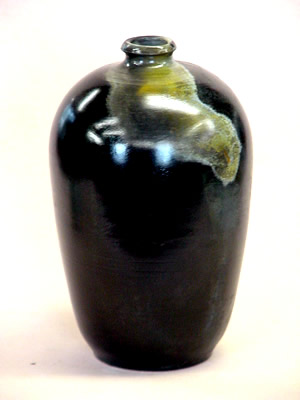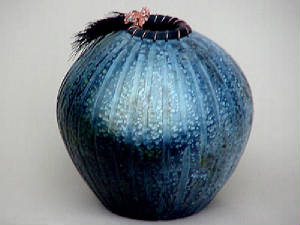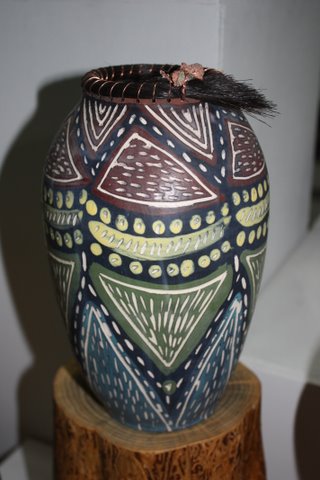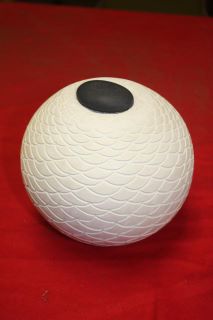|

|
| Pottery by Ed Gray |
You Can Be Anything You Want To Be
by Raud Kennedy
I was napping underneath Tina’s
dangling feet—she was the smallest of my two-legger family—while she sat on the old red leather couch between
her dad and granddad. Every now and then she brushed her toes against the fur on the top of my head. It woke me with a tickle,
but I didn’t mind. Tina was my favorite being in the whole world and could do nothing that would bother me. I just lay
there dozing and listening to what the old men had to say. When Tina’s dad took her to the park to play with the other
two-leggers her size, he was always the oldest dad there, but the other dads seemed to look up to him as if he’d been
through this many times before and was full of wisdom, as if he was the dad they’d always wanted. But he’d just
gotten a late start and was in the same boat as they were, though he never mentioned this. He did look more like a granddad
than a dad, and with Tina sitting between him and her mother’s father, the two men looked like brothers. She sat there
and giggled at the silly things they said while her feet rubbed the top of my head.
“What do you want to be when you grow up, Tina?” Granddad asked.
She pointed at me, lying on the floor. “I wanna be Charlie.”
Her dad smiled at her. He was a lawyer who had wanted to be a doctor when he was young, but the chemistry
classes that first year in college didn’t quite take. “You want to be the dog? But you can be anything you want
to be when you grow up, a doctor, a lawyer.”
She shook her head. “No, Charlie.”
Granddad rolled his eyes at his son-in-law. “Dan, she’s six years old. What six-year-old wants
to be a lawyer?”
“It’s never too soon to plant the idea. I think she’ll make a great lawyer.”
They often went back and forth like this, not agreeing, but not really disagreeing, but letting the tension
build, each finding confirmations in their opinion of the other like two old men on a park bench enjoying the possibility
of a fight without running the risk of actually having it. I could sense the tension in their voices rise and every time it
got too high, there would be a long silence, and then the build up would begin again. I didn’t like fighting, myself,
or even the chance of it. Sniff the butt, sniff the face, and then move on. They called me a people dog and they were right.
Not once had another dog given me a biscuit. Tina always shared. Sometimes unintentionally, like when she left her bowl of
ice cream unattended.
They never said I could be anything I wanted when I grew up. I was the family dog and nothing more was expected
of me. Don’t chew Tina’s socks. Carrying them around the house during times of excitement, like when the family
returned home, was okay, but don’t put any holes in them, and definitely don’t swallow them. That was bad. Not
only did they get pissed when I did it, they’d get pissed all over again when they found the sock in the yard. They
dressed Tina in bright oranges and yellows like she was their sunflower and it made her socks easy to find. They stood out
amongst all the green of the back lawn, and even passing through me couldn’t fade their colors.
I was to move when told to move,
be quiet when shouted at, pretty much just do what I was told. Tina had two older brothers who were old enough to speak almost
as well as their parents and they were sort of in the same boat as me. They were often told what to do and shouted at when
they didn’t do it. Parental barking was effective, at least in the short term. The two-leggers must’ve learned
it from us. Her brothers were frequently told they could be anything they wanted to be when they grew up, but it was followed
with subtly toned phrases like, if you applied yourself, or, if you could just focus, or, if you stopped hanging out with
that crowd. I didn’t understand the last bit because I never saw them hanging out with any crowd, but there was a lot
I didn’t get, like how they could be anything they wanted in the first place. Could they metamorphose like a butterfly?
If I’d wanted to be a German shepherd, I couldn’t because I was born a golden retriever and it was my lot in life
to feel the need to always have a bone, a ball, or one of Tina’s socks in my mouth. Not that I’d want to be a
German shepherd. They were too stressed from being on the job all the time, alert to any two-leggers who didn’t belong,
and in the eyes of a German shepherd very few did, and even those who did were often suspect.
Tina’s dad cocked his
head at her and glanced at her granddad. “You never know. With all the lawyer shows on television, she might want to
be a lawyer.”
“She’s six, for Christ’s sake,” Granddad said. “Don’t you remember what
it was like to be six?”
Her dad turned his hands over in his lap and pondered their wrinkled maps of time. “I don’t
think I was ever six. I was on the professional track from day one. My parents made sure of that. Never waste a moment. Even
the games they let me play had a purpose.”
Granddad chuckled. “I bet Monopoly was one of them.”
Dad nodded. “Yep, sure was.”
“And I bet they always told you that you could be anything you wanted to be when you grew up.”
“Yeah, they did. If I set my mind to it.”
I closed my eyes with a long sigh. Just give me a ball or a sock to carry in my mouth, I thought as Tina’s
feet rubbed the top of my head, and all is well.
Raud Kennedy is a writer and dog trainer
in Portland, Oregon. To learn about his most recent work, Portland, a collection of short stories, please visit www.raudkennedy.com

|
| Pottery by Ed Gray |
Midlife
by JP Reese
In the last two years, Louise has discovered many
frightening changes in her body. First, the Zoloft her doctor prescribed her could no longer do the job without a helpful
Abilify booster. Next, her eyes turned red and dry, but luckily, she discovered
Restasis, and even though her skin has begun to sag around the jaw line, she realizes that along with a daily dose of Oracea
for the rosacea that pinks her cheeks, she can slather on Olay Regenerist. Yes,
these last two years have been a learning experience. Louise never imagined the
risks she'd been taking by only seeing her internist once a year for a physical.
Even suffering all of these conditions, Louise considers
herself one of the lucky ones, as she's learned there are pills, drops, and creams for all of her problems. Her doctor is happy to prescribe the new medications she hears about during breaks in the nightly
news shows she watches religiously. Tests he scheduled even managed to find a few more problems Louise had not yet considered,
so now she's taking care of her cholesterol and high blood pressure with Caduet and her high triglycerides are under control
with Lovaza. Because some of these meds give her a severe case of dry mouth, her doctor suggested OraMoist patches: problem
solved! She has Blue Cross/Blue Shield with a low deductible for both prescription medications and her regular doctor's visits,
so even though she's practically falling apart, she has no worries.
All the trouble began right after Bud walked
out two years ago, the day before her fiftieth birthday. Before that day, Louise had never taken a prescription in her life
and had always been healthy as a horse. Maybe Bud sensed she was on the
cusp of a physical apocalypse when she mentioned one morning over coffee she might have that restless leg syndrome they saw
on the TV the night before; maybe that's why he took off with only the clothes on his back and his Joe Montana signed football. He never called or came by the house for any of his other things. After fifteen good years! Imagine. Whatever.
Louise does not mourn Bud's disappearance; she has
her daily schedule of pill taking to keep her busy. Who knows what might
happen if she forgets to take any one of these little miracle workers? These
days, she watches the nightly news mostly for the commercials, trying to keep ahead of whatever new malady might be creeping
up on her. Bombings in Pakistan take a back seat to overactive bladder;
global warming is a pale worry compared to potential hypoglycemia.
She's considering switching to Centrum Silver after
she saw their ad during Brian Williams' broadcast. The woman in the ad's
hair was so beautiful, and she looked so happy! And thank heaven she switched to Scott Pelley and caught the last of the Boniva
ad with that cute Sally Field, or she never would have considered bone loss and called for an appointment this morning. Tonight, she'll watch Diane Sawyer on ABC to make sure she is up to date with
all the help available out there for people like her.
Louise makes a list of errands to run after the
doctor, writing Walmart at the top of the pad and adding Refills underneath, including Nasonex (allergy season again!), Imitrex
(for those blinding headaches that come whenever she tries to clean out Bud's closet), Zicam,
because cold and flu season is right around the corner, and she writes down Boniva? in case she's right and the doctor
gives her a prescription for bone loss too. Finally, Louise writes down,
ask Dr. Walton about Lyrica for the pain, and Lunesta?!!! because she hasn't had a good night's sleep in months and that beautiful
big green moth is so relaxing as it hovers over that sleeping woman's face on the commercial.
She checks her supply of Vaniqua, a miracle cream for removing all those pesky menopausal hairs that have begun to
spring up in odd places, and she counts her OraMoist dry mouth patches. Plenty left.
Louise wonders if she'll ever have to buy tampons
again, thinks she ought to ask the doctor for some Viagra just in case Bud ever realizes the huge mistake he's made and decides
to come home. She's smarter now than she was in all those years before he left, knows now she should have agreed with him
that trying Viagra might have helped them both, but back then she'd never realized how much help there was for any problem
if a person just studied commercials between the news stories.
She smiles to herself as she grabs her purse and
keys from the hook by the back door, knowing no matter what happens from now on, there will always be a pill for that.
JP Reese has fiction, poetry, and creative
nonfiction published or forthcoming in many print and online venues. Reese
teaches English at a small North Texas college, and she is also poetry editor for THIS Literary Magazine, and Assistant
Poetry Editor for Connotation Press. Her published work is gathered at Entropy: A Measure of Uncertainty.

|
| Pottery by Ed Gray |
Dried
Egg
By Greg Stickrod
I sit across the café booth from Jake. I’m
holding the fork in front of my face, and rotating it to examine the dried egg stuck in between the tines. “It came
out of the dishwasher that way and some asshole back there”, I say, nodding my head towards the kitchen, “just
put it on my plate expecting me to eat off of it.”
Jake takes his Stetson off and runs a hand through
his thinning gray hair. “Problem with your generation, Vince, is that you’re a bunch of over entitled namby pambies.”
“I didn’t know you knew terms like ‘over
entitled,’” I say.
Jake sits staring out the window at the dry snow
being blown across the road. It covers the asphalt white at times then the next wind gust blows the snow off revealing the
dark pavement. “I know lotsa things, Vince,” Jake says, still looking out at the road, and the blowing crystals
of snow.
“Like what?”
“Protein,” Jake says. “Wars have
been fought over it. You can’t live without it. You can get protein from grass like cows do, but it’s a helluva
lot easier to get protein by eating the cow, and cows taste better’n grass. And you’re fixing to throw that precious
protein stuck on your fork away.”
“How much grass have you eaten, Jake?”
“Moren the average man. Not as much as a cow.”
Jake stands up and walks outside to his red and white
Ford pickup. I see the driver’s side door open and Jake’s head tilts back. I know he’s just taken a pull
on the pint of Jim Beam he keeps under the seat. As he walks back into the café he points at the field across the road. There
are a dozen black and white birds hopping around what looks like a lump of snow. “Magpies, they’ll risk everything
for a hunk of that winter kill lamb out there.” Jake says, still pointing.
“Let me guess,” I say.”Protein?”
Jake nods. “Look at that gray spot out there.
That’s a coyote sneaking up on them birds. Bet ya he’s been watching em for a while, knows they’re up to
something. He’ll drag the whole damn lamb carcass down into some coulee and finish it off.”
I’m still looking at the shiny little yellow
orb between the tines of the fork when the waitress comes by and pours coffee. I think of all the things I can say to her,
and then she’s gone before I say anything.
“That’s quite a hunk of protein,”
Jake says nodding at Thelma, the waitress, waddling off to the kitchen. “Of course you’d have to dig down through
the layers of lipid to get to it.”
“Lipid?” I say.
“Fat.” Jake says.
“I know you meant fat. Just surprised ‘lipid’
is in your vocabulary.”
“You’re probably surprised I’m
not knuckle-walking.” Jake says.
I take my glasses off and wipe the lenses with a
napkin. “Well, yeah, I am surprised. You’ve got the build and the temperament to be a silver back. What brought
you to eating grass?”
“Your dad and I were elk hunting in September
one year. It was bluebird weather and the elk were scattered. Didn’t see anything with antlers big enough to shoot,
and we’d been outta food for a while. So we decided to take a short cut down the mountain and just got lost as hell.
We didn’t take the horses cause it was too steep. If we’d had horses I think I would have eaten one of em.”
“I can’t believe either of you could
get lost,” I say.
“Well, we sure as hell did. As we descended
the mountain we walked straight into a cloud bank. We thought we’d walk through it but it just kept getting thicker
until it was like walking through a marshmallow.”
“Descended?” I say. “How about
‘lumbered’?”
“Smart ass.” Jake snarls. “You
think just because your old man bought you a college education that you’re the only one entitled to use those two-bit
words?”
“So what happened on that elk hunt?" I say.
Jake puts his Stetson on the seat next to him. It’s
crumpled and oil stained, while mine looks like it just came out of the box. Jake
leans back in the booth. “Cold as hell it was up on that mountain with the snow clouds swirling around us. We climbed
into our bedrolls to wait it out. There was sun in our face when we woke up, the bluebird weather had returned. I’m
near hallucinating from the hunger not having had food in 48 hours. I says, ‘I’ll have the eggs Benedict, hash
browns, and a bottle of bubbly.’ I’ve got my eyes closed imagining that feast when I feel something being tucked
into my hand. Your dad put a big ol' wad of grass in my fist and says there’s your breakfast, sir. I chew off a bite
of it and grind it between my molars. Then I look up and see your dad lying on a flat rock. Soon enough a lizard darts out
to sun itself and your dad snatches it in his fist with a rattlesnake like strike. He pops the whole thing in his mouth, chews
a couple of times and swallows. ‘What the hell, I yell out; you’re eating meat and feeding me grass.’ He
says something about me being more bovine than he is and figures I can live on cow food. About that time he snatches another
one of the lizards and he’s trying to get it into his mouth when it bites into his lip. It ain’t going to let
go so your dad pinches its head off and swallows the wiggling body. He grabs another lizard and looks at it and says ‘protein’.
I damn near became a herbivore right then and there.”
God, my dad could eat live lizards and I can’t
even deal with a little dried egg, what a wuss I am.
The waitress sets my pancakes down and being starved
I dive into them ravenously. As the waitress waddles back with Jake’s steak and eggs Jake says, “I promised your
dad before he died that I would teach you something every time I saw you.”
“Like what?” I ask.
Jake holds his fork up to the waitress. “Thelma,
I warned you if I ever found dried egg on my fork again that you’d be paying for my meal.”
Thelma grabs the fork and waddles off to fetch a
clean one.
It takes me a minute to catch on. I look at Jake,
“Asshole.”
Jake smiles.
Greg Stickrod was born in Montana, and completed a
graduate degree at the University of Oregon. After a forty year career in biomedical research he plans to move back to Montana to further his writing
(and his fly fishing). He has published previously in The Smoking Poet.

|
| Pottery by Ed Gray |
Hitchhiking
By Selva Rolin
Thumb poised, I fished him in. He rolled up in a
gurgling Citroën 2CV, rosy as his nose, and me, in my black dress. “Very much the fashion,” he said, and analyzed
the image I set forth: my heels two bite-worn fangs feeding on roadside gravel, and a tired lover of suitcase I’d dragged
all over Europe. I scooted in the car.
He fondled pewter stubble and strained a few droplets
of English, “I didn’t spoke for years.”
I flinched each time he stressed his words, his
I’s shrieking lost dots and TH’s
fussing like bees.
“You like my two horse?” he posed.
“Your
what?”
It sounded provocative.
“Dzee
car. Deux chevaux.”
The carpet sprouted signs of libertine picnic and
stable madness.
“It’s elegant.”
I braced for critique.
“Élégant?”
he asked.
Save
yourself, Eli! “And filthy.”
Point scored. I sighed, peeled pumps from tender
soles.
“Why am I in France?” I repeated his
next query.
“Oui,”
he exaggerated in an exhale.
Museum patios, opera loos, and wisteria spiraled
up and down the lost stairwells of my thoughts. A cigar dove from his lips and aimed for the world; his lighter flip-topped
sparks of charm.
“The men seem modest and the wine has character.”
Curiosity sponged smoke from his face.
“Ou
l’inverse!” He laughed. “Bravo! Très bien!”
His eyes flickered like castle torches buttressing
motes of night. He caressed his goatee and it nearly singed while he explained how to sculpt le corps.
“Dzee mind draw many, many words!”
I focused on his leaping pout as he nasalized accuracy,
spat tobacco bits and gestures.
“A poet?” I asked.
“Non, non, non! Un poète. Le poète. Dzee best
on France.”
We pulled into L'Hôtel Nostalgie where
he pocketed desk clerk kisses and room keys.
“You already had a reservation?” I asked.
“Euh,”
he said, dodging a grinning fib, "non."
In the room zippers called forth fingers and curled
skin and on the bed he was a master artiste bringing shadows and hues to life.
Hand held high and ambassador-like, he nodded.
“Non,
non...oui, yes, voilà!”
Plucking a pen from his teeth, he brushed the stage
curtains of his hair aside and prepped for the performance: he began to fence with his notepad. Light jostled through an eyelet-maned
fenestra like a bashful child wanting to push beyond understanding, and quick-witted ink delved deep into the afternoon.
I awoke the next morning wrapped in the scent of
spicy Partagás and sheets; I climbed out of the cocoon I was in and stretched. The sun, brave and vibrant, proud-chested past
dawn and flooded the room. On the pillow lay a rose and a note that read:
Ma
belle, merci pour l’inspiration! Sincèrement, le poète.
I picked up my suitcase, resurrected from a Sunday’s
rest, and headed down the stem of the road. Answers were everywhere, plummeting off the plank of the horizon, loosening from
buds and spreading arms for the release, and suddenly I could see her—I could see Beauty, and she was lovely.
Selva Rolin's poetry
and fiction have appeared in various publications: Ellipsis, The Smoking Poet, The
New Writer, the novel entitled, Love Like That, by Amanda Hill, and Poetry. Possessing a passion for discovering other cultures and learning languages, Selva feels like the luckiest
girl on Earth to have lived in Spain, France, Italy, the United States, Canada, and Brazil. Currently, she is diving into
the basics of Portuguese in Rio de Janeiro and searching for an agent to represent her novel.
|

